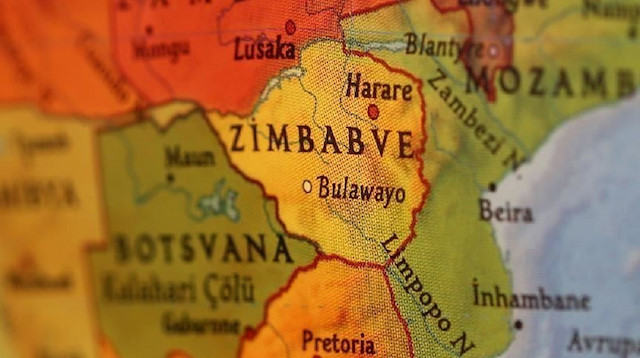Trauma of genocide lives on in Zimbabwe

Country commemorates National Unity Day on Dec. 22 but many shudder at memories of genocide
Zimbabwe 32 years ago ended a genocidal war that massacred thousands in Matabeleland and Midlands provinces.
Reklam yükleniyor...
Reklam yükleniyor...
But more than three decades later, Msitheli Ndlovhu from Nkayi districts in Matabeleland North Province still suffer trauma from the atrocities.
Msitheli was only 14 years old when the war was halted in the southern African nation in 1987.
Yet, he was only 9 years old when eight members of his family were rounded and locked in a thatched hut in their rural home before it was set on fire by government soldiers.
“It was in 1983 and I was just coming from school when my parents, my brothers and sisters were driven at gunpoint into our kitchen hut before it was set on fire by soldiers,” Msitheli told Anadolu Agency. “Everybody was being accused of supporting anti-government rebels.”
For Msitheli and several others who went through the experiences of the 1980s genocide, trauma has remained etched in their memory decades on end.
Even as the country commemorates National Unity Day celebrated on Dec. 22, many like Msitheli shudder at the memories of the genocide.
Unity Day was set up by the government in commemoration of the unity accord between the Zimbabwe African People's Union (ZAPU) and the Zimbabwe African National Union (ZANU) -- the two major political parties which feuded during atrocities soon after the country gained independence from Britain.
“Nothing is there for me to celebrate about the Unity Day. For me it is a day to remember the massacre of many of my people in the Matabeleland region,” said Msitheli, who claims he still has no birth certificate nor national identity card because authorities barred him from getting one since there are no death records for his parents killed during the genocide known as “Gukurahundi.”
Loosely translated from the Shona language, “Gukurahundi” refers to the early rain which washes away the chaff before the spring rains, but literally it was a series of massacres of Ndebele-speaking Zimbabweans carried out by the Zimbabwe National Army in the early 1980s to late 1987.
Since Zimbabwe eventually won independence in 1980, ZAPU and ZANU, often clashed over major political decisions, resulting in violent clashes.
But in 1987, leaders of the parties decided to put an end to confrontation and merged, creating the Zimbabwe African National Union Patriotic Front (Zanu-PF) following the signing of the Unity Accord on Dec 22.
National Unity Day was officially established a decade later in 1997 to commemorate the 20th anniversary of the Unity Accord which is now a public holiday widely celebrated throughout the nation.
Yet, for many affected civilians from regions hit by the massacres like Msitheli, “there is nothing to celebrate about the day.”
“It’s a day of mourning for us Ndebele people; we are a forgotten tribe, still being punished by the regime here, suffering and no one has come out to apologize openly for the killing of our loved ones,” said Msitheli, who works as a gardener in one of the posh suburbs of Harare to support his family. It is the only other job he said he can do because he does not have a national identity card.
More than 20,000 Ndebeles were killed during Zimbabwe’s the genocide perpetrated by members of the military’s Fifth Brigade, which was a group of North Korean-trained Zimbabwean soldiers who carried out the ethnic massacres, targeting the Ndebele people in the southwest of the country.
Former Zimbabwean President Robert Mugabe who died in September, refused to apologize for the disturbances, choosing rather to say “it was a moment of madness.”
But, primarily Ndebele-speaking ZAPU people whose armed wing was ZIPRA, the Zimbabwe African People’s Revolutionary Army, were considered a credible threat to Mugabe’s government because it was trained by Russians and Cubans, and Mugabe’s regime therefore feared ZAPU would use ZIPRA soldiers.
Consequently, the Fifth Brigade and police worked to eliminate that threat, with many civilians caught in the process.
Like his predecessor, current President Emmerson Mnangagwa who took power from Mugabe following a military coup in 2017, has also not helped matters.
Yet, Mnangagwa was Zimbabwe’s Minister of State Security during the time of the massacres.
In an interview with BBC journalist Mishal Husain in Davos last January, Mnangagwa repeatedly refused to apologize for crimes committed during Gukurahundi, when he served under Mugabe.
To other survivors of the massacres like 50-year-old Phindile Dube, even Mnangagwa has proved to be stubborn in fending off the effects of the massacres years later.
“Mnangagwa is extremely rude. He should have said sorry before. He is refusing to just extend an apology, which means the killings were a well-planned thing,” Dube told Anadolu Agency.
So, even as survivors of the atrocities have put up memorials to remember their loved ones buried in mass graves in places like Maphisa, a key district where mass killings were carried out, the memorial sites have not been acknowledged by the government.
Reklam yükleniyor...
Reklam yükleniyor...







Comments you share on our site are a valuable resource for other users. Please be respectful of different opinions and other users. Avoid using rude, aggressive, derogatory, or discriminatory language.